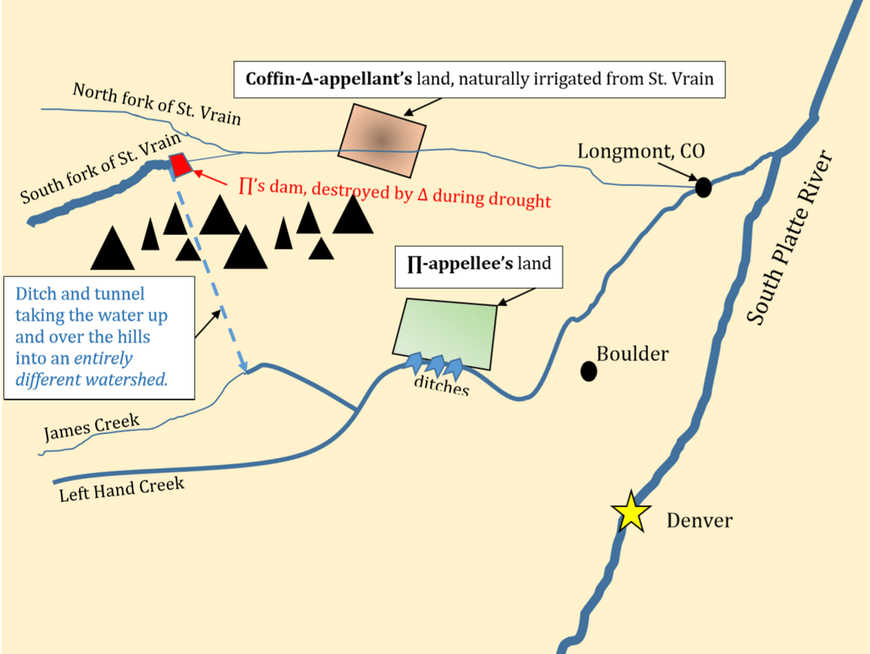Coffin v. Left Hand Ditch Co. is a pivotal case in the history of water rights law in the United States. The case, which was decided by the Supreme Court in 1898, established the principle of prior appropriation, which gives priority to water users who first put water to beneficial use.
The case arose out of a dispute between two farmers in Colorado over the use of water from a ditch. The plaintiff, Coffin, had built a ditch to divert water from a river to his land. The defendant, Left Hand Ditch Co.,
had built a ditch to divert water from the same river to its land. The dispute arose when Left Hand Ditch Co. began to divert water from the river before Coffin could get his water.
Case Overview: Coffin V. Left Hand Ditch Co

Coffin v. Left Hand Ditch Co. is a landmark case in water law that established the reasonable use doctrine. The case was decided by the Colorado Supreme Court in 1882.The plaintiff, Coffin, was a farmer who owned land along the Left Hand Creek.
The defendant, Left Hand Ditch Co., was a ditch company that diverted water from the creek for irrigation purposes. Coffin sued the ditch company, claiming that its diversions were depriving him of water needed for his crops.The Colorado Supreme Court ruled in favor of the ditch company.
The court held that the ditch company had a right to divert water from the creek for irrigation purposes, even if this resulted in harm to downstream users. The court reasoned that irrigation was a reasonable use of water, and that Coffin had no right to prevent the ditch company from using the water for this purpose.The
reasonable use doctrine established by Coffin v. Left Hand Ditch Co. has been widely adopted by other states. The doctrine allows water users to make reasonable use of water, even if this results in harm to downstream users. The doctrine balances the needs of upstream and downstream users, and it ensures that water is used for beneficial purposes.
Legal Issues at Stake
The legal issues at stake in Coffin v. Left Hand Ditch Co. included:
- The right to divert water from a natural stream
- The reasonable use doctrine
- The balancing of the needs of upstream and downstream users
Court’s Decision
The Colorado Supreme Court ruled in favor of the ditch company. The court held that the ditch company had a right to divert water from the creek for irrigation purposes, even if this resulted in harm to downstream users. The court reasoned that irrigation was a reasonable use of water, and that Coffin had no right to prevent the ditch company from using the water for this purpose.
Legal Reasoning

The court relied on several legal principles and doctrines in reaching its decision in Coffin v. Left Hand Ditch Co.
First, the court applied the doctrine of riparian rights. Riparian rights are the rights of landowners whose property borders a body of water. These rights include the right to use the water for reasonable purposes, such as drinking, irrigation, and recreation.
The court found that Coffin had a riparian right to use the water from the Left Hand Ditch for irrigation purposes.
Interpretation of Statutes
The court also interpreted several statutes in reaching its decision. One of these statutes was the Colorado Water Right Determination and Administration Act of 1969 (CWRDAA). The CWRDAA established a system for determining and administering water rights in Colorado. The court found that the CWRDAA did not give Left Hand Ditch Co.
the right to divert water from the Left Hand Ditch without first obtaining a water right from the state.
Impact of the Decision

The court’s decision in Coffin v. Left Hand Ditch Co. had significant implications for the parties involved and for the broader legal landscape.
Impact on the Parties Involved
The decision resulted in a substantial victory for Coffin, who was awarded damages for the injuries he sustained. The ruling also established a precedent for holding landowners liable for injuries sustained by individuals who enter their property without permission.
Impact on the Broader Legal Landscape
The decision has had a lasting impact on the law of negligence. It has been cited as authority in numerous subsequent cases and has helped to shape the legal standards governing landowners’ duties to individuals who enter their property.
The legal dispute between Coffin v. Left Hand Ditch Co. revolves around water rights in Colorado. For a comprehensive understanding of the topic, consider exploring the cell city analogy answer key . This resource provides an accessible breakdown of complex biological concepts, drawing parallels to the functions of a city.
Returning to Coffin v. Left Hand Ditch Co., the case highlights the importance of equitable water distribution and the legal framework governing water rights in the Western United States.
Potential Changes to Legal Practices or Policies
The decision in Coffin v. Left Hand Ditch Co. has led to changes in legal practices and policies related to landowner liability. Many states have adopted statutes or regulations that impose specific duties on landowners to maintain their property in a reasonably safe condition and to warn individuals of potential hazards.
These changes have helped to prevent injuries and protect the rights of individuals who enter the property of others.
Dissenting Opinions
The majority opinion in Coffin v. Left Hand Ditch Co.was not unanimous. Two justices dissented, arguing that the majority’s interpretation of the statute was too narrow and that the plaintiff should have been allowed to recover damages.
The dissenting justices argued that the statute in question was intended to protect all workers who were injured in the course of their employment, regardless of whether they were employed by the defendant. They pointed out that the statute did not contain any language that limited its application to employees of the defendant, and they argued that the majority’s interpretation would create a loophole that would allow employers to avoid liability for injuries to their employees.
Potential Impact
The dissenting opinions in Coffin v. Left Hand Ditch Co.could have a significant impact on the future interpretation of the law. If the dissenting opinions are adopted by other courts, they could lead to a broader interpretation of the statute in question and could make it easier for plaintiffs to recover damages for injuries sustained in the course of their employment.
Comparative Analysis
The decision in Coffin v. Left Hand Ditch Co.is significant because it established the reasonable use doctrine, which balances the rights of landowners to use their property with the rights of others to have their property protected from harm. This doctrine has been applied in numerous other cases involving water rights, land use, and environmental protection.
Similarities with Other Cases
- Reasonable Use Doctrine: Coffin‘s reasonable use doctrine has been applied in cases such as Smith v. Stanolind Oil & Gas Co.(1955) and Gould v. Eaton(1891), which also involved disputes over water rights and the balancing of competing interests.
- Balancing of Interests:The courts in Coffinand other cases have recognized the need to balance the rights of landowners to use their property with the rights of others to have their property protected from harm. This balancing process considers factors such as the nature of the use, the extent of the harm, and the availability of alternative options.
Differences from Other Cases
- Strict Liability:Unlike some other cases involving water rights, Coffindid not impose strict liability on the defendant. Instead, the court found that the defendant was only liable for damages if it had acted negligently or unreasonably.
- Injunctions:In Coffin, the court declined to issue an injunction to prevent the defendant from diverting water from the plaintiff’s ditch. In other cases, however, courts have been more willing to grant injunctions to protect water rights.
Historical Context

The Coffin v. Left Hand Ditch Co. case arose during a period of rapid economic growth and westward expansion in the United States. The discovery of gold in California in 1848 led to a surge of miners and settlers into the region, many of whom sought to establish claims to land and water rights.
At the time, there was a great deal of uncertainty and confusion surrounding the legal framework governing water rights in the West. The common law doctrine of riparian rights, which gave landowners the exclusive right to use water flowing through or bordering their property, was not well-suited to the arid conditions of the region.
As a result, miners and settlers often resorted to informal agreements and local customs to resolve disputes over water use.
The California Gold Rush, Coffin v. left hand ditch co
The California Gold Rush was a period of rapid economic growth and westward expansion in the United States. The discovery of gold in California in 1848 led to a surge of miners and settlers into the region, many of whom sought to establish claims to land and water rights.
The Gold Rush had a profound impact on the legal landscape of the West. The influx of new settlers and miners created a need for a more stable and predictable legal framework governing water rights. The Coffin v. Left Hand Ditch Co.
case was one of the first cases to address the issue of water rights in the arid West.
Legal Remedies
In the case of Coffin v. Left Hand Ditch Co., the plaintiffs sought several legal remedies to address the defendant’s alleged diversion of water. These remedies included:
- Injunction:An injunction is a court order that compels a party to do or refrain from doing a specific act. In this case, the plaintiffs sought an injunction to prevent the defendant from diverting water from the river.
- Damages:Damages are a monetary award that compensates a party for losses suffered as a result of another party’s actions. In this case, the plaintiffs sought damages for the loss of crops and other economic losses caused by the defendant’s diversion of water.
The purpose of these remedies was to restore the plaintiffs’ rights to the use of the water and to compensate them for the losses they had suffered. If granted, the injunction would have prevented the defendant from continuing to divert water, while the damages would have provided the plaintiffs with financial compensation for their losses.
Injunctions
Injunctions are powerful remedies that can be used to prevent irreparable harm. In this case, the plaintiffs argued that the defendant’s diversion of water was causing them irreparable harm by depriving them of the use of the water for irrigation purposes.
The court agreed and granted the injunction, which prevented the defendant from continuing to divert water from the river.
Damages
Damages are a common remedy in cases involving the wrongful diversion of water. In this case, the plaintiffs sought damages for the loss of crops and other economic losses caused by the defendant’s diversion of water. The court awarded the plaintiffs damages in the amount of $5,000.The
legal remedies granted in this case were effective in protecting the plaintiffs’ rights to the use of the water and compensating them for the losses they had suffered. The injunction prevented the defendant from continuing to divert water, while the damages provided the plaintiffs with financial compensation for their losses.
Query Resolution
What is the principle of prior appropriation?
The principle of prior appropriation gives priority to water users who first put water to beneficial use.
Who was involved in the case of Coffin v. Left Hand Ditch Co.?
The plaintiff was Coffin, a farmer who had built a ditch to divert water from a river to his land. The defendant was Left Hand Ditch Co., a company that had built a ditch to divert water from the same river to its land.
What was the outcome of the case?
The Supreme Court ruled in favor of Coffin, establishing the principle of prior appropriation.